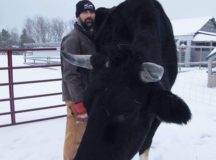Knickers the steer has caught people’s interest, around the world.
The 6’4″ steer is so much bigger than the cattle he lives with that he has become an Internet sensation. Knickers lives in Australia and weighs 1,400 kilograms. An average bull weighs about 1,100 kgs.
Tyne Logan, at the Australian Broadcasting Corporation (ABC) told reporter Jacqueline Lynch about an enormous Holstein Friesian steer he had seen. She went along to see for herself just how big Knickers is. On the ABC website, she says Knickers was “pretty intimidating when all of his 1,4000 kilograms first came lumbering through the gate towards me.”
Tag: Internet
Facebook CEO Answering Tough Questions From US Government
Mark Zuckerberg, the high-profile creator and CEO of social media website Facebook, is being asked a lot of tough questions by the US government.
US Senators were asking him how Facebook uses the personal information it collects on people who use the popular social media website.
When people join Facebook and use it, they provide lots of information on themselves. Companies pay to use that information when they post advertisements.
If they have information about a person — for instance, whether they have kids, or where they like to go on holiday — they can do a better job targetting ads at them. That makes the person more likely to buy the product that’s being advertised.
That’s only one way companies use people’s personal information. Other people, who may be less honest, can sometimes use personal information to try to take advantage of people.
The Truth About Tech
Some of the people who created many popular apps are telling kids to put their phones away–at least, a bit more often.
The Center for Humane Technology is made up of people who used to work for big tech companies like Google, Facebook and Twitter. Now they want kids to stop using those apps and websites so much.
In early February the Center, along with Common Sense Media, launched an awareness campaign called the Truth About Tech. Its goal is to teach students, parents and teachers about the dangers of spending too much time on smart phones and tablets.
“Fake News” Is Hard For Kids To Spot
There is a lot of “fake news” on the Internet. A new study shows that many young people in the United States have a hard time telling “real” from “fake” news.
Fake news is exactly what it sounds like. It’s an article that may look just like any other news article–except that it’s not true. Unfortunately, many people can’t tell the difference.
New Barbies Have Different Body Shapes Than Before
Barbie dolls have a particular look to them. They’re thin, tall, long-legged… and virtually unlike any real human being.
World Economic Forum Aims “To Improve The State Of The World”
Last week, politicians and business leaders from around the world met in Switzerland to “improve the state of the world.” The meeting is called The World Economic Forum and it happens once a year.
Outpouring Of Support For France
People around the world are expressing encouragement and support for the people of France. In particular, for the people in its capital city, Paris.
Toronto Police Officer’s Random Act Of Kindness Goes Viral
Toronto police officer Mark Borsboom is a bit amused by social media — he doesn’t quite understand what all the fuss is about.
And his opinion hasn’t changed, now that a photo of him has gone viral.
The photo captures the officer doing a simple, good deed—tying an elderly man’s shoelace for him.
Borsboom was on a paid-duty assignment, helping cars leave a parking garage, when he was approached by the man, who asked for his help.
Google Wants To Be More “Diverse”
A major company says it wants to become more “diverse.”
Diverse in this case means it wants to hire more workers who come from different backgrounds or have different genders or are from different cultures.
Mystery Unfolding At Western University
There’s a terrific mystery in the library at the University of Western Ontario.
But it’s not a novel. It’s a trail of mysterious notes that have been left in the books in the university’s Weldon Library.
Mike Moffatt is an assistant professor of Business and Economics at Western.
On March 9 he took an economics book off the shelf and was surprised when an envelope fell out of its pages.








